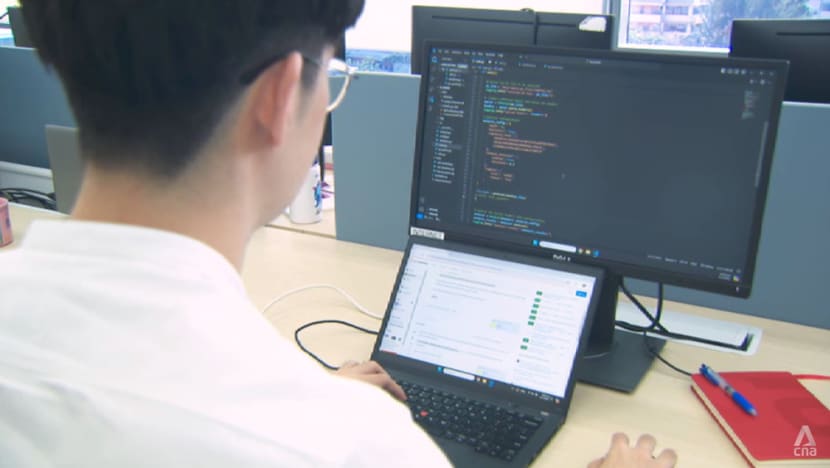Universities in Singapore revising IT, digital modules to keep up with industry demands
Human resource experts told CNA that specialisation will be crucial in enhancing one's employability.

Some Singapore universities are introducing more specialised courses in their information technology and digital curriculum to keep up with changing industry demands.

This audio is generated by an AI tool.
SINGAPORE: Some Singapore universities are introducing more specialised courses in their information technology and digital curriculum to keep up with changing industry demands.
They hope that the move, which includes arming undergraduates with industry certifications to go beyond their general tech degrees, will help them be more employable.
Human resource experts told CNA that such specialisation will be crucial in enhancing one's employability, given that challenges in the tech market are likely to persist.
IMPROVING STUDENTS’ EMPLOYABILITY
Cybersecurity provider Ensign InfoSecurity has been on the lookout for talent, but its search has been bumpy with fresh graduates lacking certain skill sets that they are looking for.
To ease the problem, the company came up with its own ethical hacking boot camp to upskill and identify potential employees.
“We don’t just expect our fresh graduates or fresh hires to be able to have all of these skill sets, and I say this in the context of rapid technological changes,” said the firm’s vice president of human resources Serene Yeo.
“As technology evolves, we need our fresh grads and our new hires to evolve along with it, so skill sets can be learned (and) can be picked up.”
The skill sets that the firm hires for “are diverse and wide-ranging”, Ms Yeo said.
For instance, incident responders, who analyse how a breach occurs and suggest a fix so that it does not happen again, usually have a knack for discovering patterns.
“(For this role), from a skill set standpoint, I think what would be really desirable would be people who can automate workflows so that we can more quickly detect and discover where the issues are,” said Ms Yeo.
“So usually the skill sets that come along with that would be in AI, because this would then enable us to more quickly get to the heart of the matter for the client.”
The rate for IT and digital tech fresh graduates getting full-time permanent jobs has dropped by 5 percentage points since 2021.
Institutes of Higher Learning, such as the Singapore University of Social Sciences (SUSS), are trying to boost their students' chances of getting a job.
Associate Professor Zhu Yongqing, head of the information and communication technology programme at SUSS, said it is incorporating industry certification courses into its existing ICT curriculum, among other efforts.
“We work together with the industry partners to offer certification courses in different ICT areas, which include cloud computing, system administration, (and) data communication,” she noted.
“So upon completion of these courses, if students can pass the certification exams, they will be awarded the highly-recognised industry certificates. This will help students to improve their employability.”
In the coming semester, more AI-focused courses will be included in the syllabus, she added.
There are also plans to launch a new minor programme in generative AI, which can be taken by students from non-tech majors.
However, she noted that students need to build strong foundations before pursuing specialised skills.
CHANGING SKILL SETS NEEDED
Industry observers told CNA that the skill sets employers are looking for in tech talent have drastically changed in recent years.
Now, employers are seeking individuals with experience in areas such as AI, cybersecurity, and data science.
“(For data), the client is looking for data extraction experience, data visualisation experience, so that's something which is becoming critical,” said tech recruiter Anmol Singh, associate manager of recruitment agency Michael Page Singapore.
“Now, if fresh (graduates) are coming with that kind of experience, and I'm not saying that they have working experience, but a bit of practical knowledge, that would be something which is going to be beneficial.”
He added that relevant industry certificates and internships can give students “an added advantage” and help them stand out in the job market.
“It’s never too late. There’s always time to upskill yourself, train yourself, (and) get certified,” said Mr Singh.
“In order to be competitive, we have to make sure that the skills that employers are looking for are there.”


















